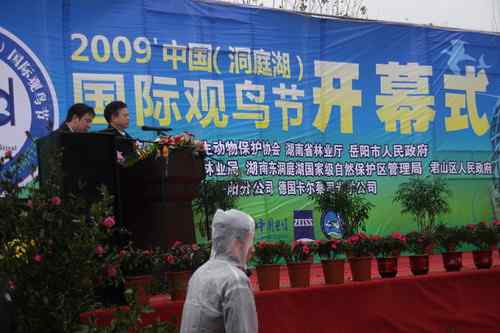哥本哈根会议闭幕
并没有制定解决气候变化的协定。
COP-out at Copenhagen
21-12-2009
The fair, ambitious and legally binding agreement to tackle climate change, which was scheduled to be finalised at the recently concluded UNFCCC Climate Change Conference (COP) in Copenhagen, did not materialise
This latest of 15 Climate Change COPs was mandated to agree a new global climate deal under the UNFCCC umbrella, to address emission reductions and adaptation to climate change. But with some of the 192 participating governments negotiating with each other away from the main conference proceedings, acrimonious disputes about the legal shape of a new treaty ate up trust and patience, and above all, time. Instead of the hoped-for new legally binding climate change treaty, there is the Copenhagen Accord
“So much depended on getting the right result from Copenhagen,” said BirdLife’s John Lanchbery, who has attended all the Climate Change COPs. “The actual outcome gives a whole new meaning to that quote from Shakespeare’s Hamlet, 'something is rotten in the state of Denmark'."
The Copenhagen Accord does not contain targets to help tackle climate change. There is no agreement on a long-term global mitigation target of 50% by 2050 to avoid dangerous climate change. There was also no agreement that global emissions should peak by 2015-2020. According to the Intergovernmental Panel on Climate Change, both targets are necessary to achieve stabilisation of greenhouse gas concentrations at 450ppm, and to avoid global temperature rises of more than 2°C above pre-industrial levels, which would result in dangerous and irreversible effects on nature, people and the economy.
“The BirdLife Partnership asked the world’s leaders to agree concrete targets in Copenhagen to reduce greenhouse gas emissions, and they have failed us”, said Melanie Heath – Senior Advisor on Climate Change at BirdLife.
However the Copenhagen Accord does provide political context and shape, and forms a useful, if inadequate basis for negotations and agreement next year.
“It is essential that countries build on this accord, and the texts developed since Bali in 2007, to work together to finalise a strong and legally binding agreement as early as possible in 2010. The world’s people and ecosystems cannot afford, and some of them will not survive, the environmental, social and economic consequences of further delay”, said Melanie Heath.
"The process will start again next year, leading up to COP 16 in Mexico”, said John Lanchbery. "Perhaps it will be all the better for the nasty surprise we had in Copenhagen."
The BirdLife Partnership believed any global deal agreed in Copenhagen must address our 5 asks. Here’s how the Copenhagen Accord shapes up against them:
1. Cut global emissions by the amount needed to limit global average temperature rises to less than 2°C above pre-industrial levels. Developed countries should take the lead in cutting emissions, but rapidly industrialising developing nations must act too. Global emissions must peak and decline well before 2020, and go to 80% below 1990 levels by 2050. Industrialised countries must take on targets of 40% reductions below 1990 levels by 2020.
Signatories to the Copenhagen Accord agree that deep cuts in global emissions are required according to science, and as documented by the IPCC Fourth Assessment Report, with a view to reducing global emissions so as to hold the increase in global temperature below 2°C. The Accord sets a timetable for countries to submit details of their emissions reductions commitments and actions by 31 January 2010.
But there was no agreement on a long-term global mitigation target to avoid dangerous climate change. There was also no agreement that global emissions should peak by 2015-2020, and nothing is legally binding.
2. Recognise the vital importance of safeguarding biodiversity, ecosystems and the essential services they provide in climate change mitigation, in particular, reducing emissions from deforestation and degradation (REDD). Tropical deforestation accounts for 15-20% of all human-induced emissions, and must be reduced to zero by 2020. REDD should prioritise conservation of natural tropical forests because they are the most carbon-dense, and must exclude conversion of natural forests to industrial forests or plantations. REDD must include provisions which ensure conservation of biodiversity because it is the plants and animals in natural forests that help create their carbon density. REDD must respect, support and promote the rights of local and indigenous peoples.
The Copenhagen Accord recognises the crucial role of reducing emission from deforestation and forest degradation, and the need to enhance removals of greenhouse gas emission by forests. It agrees on the need to provide positive incentives to such actions through the immediate establishment of a mechanism, including REDD-plus, to enable the mobilisation of financial resources from developed countries.
Urgent further work is needed in 2010 to fully develop and operationalise a REDD regime.
3. Recognise the vital importance of safeguarding biodiversity, ecosystems and the essential services they provide in climate change adaptation. Healthy bio-diverse environments play a vital role in maintaining and increasing resilience to climate change. Copenhagen outcomes should encompass taking an ecosystem approach to all adaptation, should refer to the direct use of ecosystems as part of a strategy to help people adapt to the adverse effects of climate change, and should recognise vulnerable ecosystems as a priority concern.
Signatories to the Copenhagen Accord recognise the critical impacts of climate change on countries particularly vulnerable to its adverse effects, and stress the need to establish a comprehensive adaptation programme including international support.
However this needs to move forward and be built upon urgently within the final agreement. It lacks substance and falls far short of what is needed to safeguard the countries, people and ecosystems most at risk from climate change impacts.
Support for recognition of the role of ecosystems received support, and BirdLife will work to ensure that this is included in the final agreement.
4. Provide funding for developing countries to reduce emissions from deforestation, enable adaptation to climate change, and support low-carbon development. At least $200 billion will be needed annually by 2020, including $35 billion for REDD, and $100 billion to enable developing countries to adapt to the inevitable impacts of climate change.
The Copenhagen Accord states that the collective commitment by developed countries is to provide new and additional resources, including forestry and investments through international institutions, approaching USD 30 billion for the period 2010-2012, with balanced allocation between adaptation and mitigation. Funding for adaptation will be prioritised for the most vulnerable developing countries, such as the least developed countries, small island developing states, and Africa. In the context of meaningful mitigation actions and transparency on implementation, developed countries commit to a goal of mobilising jointly USD 100 billion dollars a year by 2020 to address the needs of developing countries.
This goes some way to address financial asks but falls short of our asks of acceptable, adequate, new, predictable and equitable funding for developing countries.
5. Ensure that when developed countries account for their land-use sectors they account fully for carbon emissions to, and removals from, the atmosphere. Current rules enable countries to hide emissions whilst claiming credit for carbon storage, and the rules proposed for Copenhagen were shaping up to be even worse than the old ones.
Nothing on new rules is included in the Copenhagen Accord. The text worked on during the course of the two weeks negotations in Copenhagen should be the basis for ongoing negotiations in 2010. This issue remains as key as ever. If developed countries are allowed to continue to hide their emissions from their land use accounting, this will seriously undermine any legally binding emission reduction targets that they set.
华东树懒 2009-12-29 07:45
一个扯皮的盛会结束了……
Simba 2009-12-29 07:51
本来可以做得更好的,只是人类尔虞我诈的太多了。灾害未到眉睫,是很难共赴时艰的。













发表评论:
◎欢迎参与讨论,请在这里发表您的提问或看法,交流您的观点。